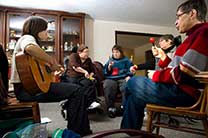The transition process will involve more than the housemates and their families. Support staff will be an integral part of the group, not only in the daily routine but also in helping the residents to flourish.
So prepare and train the support staff as your family prepares for this transition. Whether you are contracting an agency or are managing staff yourself, you should be closely involved in the training process.
Include Staff When Preparing for a Move
When staff members begin work, they have a great deal of information to absorb. It will be helpful to present information both verbally and in writing, with the most important items available for staff to read through as they begin working.
Provide this information in a notebook about each person living in the home. The residents’ Life Plan Notebooks, or an abridged form, can serve this purpose, as can the Letters of Intent.
It’s not necessary for direct support staff to have all of the background information included in a letter of intent; you can convey what is most important in the notebook for direct support staff and provide a copy of the actual letter to the manager or program coordinator.
A Notebook and Letter for Staff
The most effective information that families can provide is in the form of a letter to staff from the child. Keeping a notebook about your child can be a useful reference tool for support staff.
This letter should appear in the front of the aforementioned notebook and be shared with staff when they are first hired. Written in your child’s voice, the letter should tell staff the most important things they need to know about your child. Whenever possible, the child should help write this letter. Andrew’s letter is a great example.
Andrew’s Letter to Support Staff
Hi,
My name is Andrew, and that is what I like to be called (not Andy or Drew). I live alone here in my apartment. I can do most things for myself but need someone to check in with me each day and help with some things. I work 5 days a week at the grocery store down the street. I get my schedule on Wednesday for the next week.
I like to hang out with my friends down at the skating rink or at the diner across the street. I also invite people to my house to watch TV or just hang out. I am a real fan of the Indians and Cavaliers and don’t like to be bothered when the games are on TV!! I also like to play videogames and have a very big collection.
My house is usually kind of messy. I don’t mind that, and would rather staff didn’t try to clean it up. When they do I can’t find anything. I do occasionally need a reminder about keeping things clean enough to be healthy (washing the dishes, taking out the trash, and scrubbing the toilet and tub).
I can cook a few easy meals, all of the things that I really like. I need some help each week planning a menu and making a shopping list. I’m not so good at sticking to my grocery budget and need staff to help with the shopping. I also have trouble keeping the checkbook balanced and planning for how much I spend. My brother helps me pay my bills and sets up envelopes each week for the different things that I want to spend money on. Staff needs to help me check the envelopes each day and help me make good spending choices.
I have trouble with my moods, because sometimes I am really up and other times I am really down. I take medicine that helps me stay somewhere in the middle. I can take my medication myself.
I can also have a pretty bad temper. This usually only happens when I think that someone has treated me unfairly or like a child. I can accept help and reminders if people talk to me like I am an adult. When staff have to help me make a good choice it works best if you explain things once, in simple words that I can understand, then just give me time to think about it. Usually I will do what is right and like to be told when I have made a good choice. If I make a bad choice I know I will have to live with what happens, but I don’t like to hear “I told you so.”
– Andrew
Other information in the notebook will enhance the staff relationships with your child, such as:
- daily routine
- likes and dislikes
- dates and celebrations of important events
- a description of how your child expresses him or herself
- a list of family and friends
- other miscellaneous information that staff might need or find helpful
Also make sure that staff members understand how the home is being managed. For example, they should be aware of how the parents’ group is organized. Staff members also need to know who will be responsible for maintenance and how household funds will be managed. Parents should meet with new staff to explain their expectations prior to the move.
Prepare Staff Work Space
Every approach to staff space within a home differs. It is important to realize, however, that the staff does require their space in order to complete paperwork.
Some agencies try to minimize the effect on the home by putting a table or desk in the basement. Sometimes agencies take up living space for such things as a phone, copier, fax machine, computer and desk. Parents need to have a frank discussion with staff or the provider agency about where these administrative functions will take place in the home.
Training
Be sure to train new staff with personal information about your child that reveals his or her individuality, as well as the dynamics of the house.The most important aspect of training new staff will be giving them an opportunity to get to know the individuals living in the home. How this happens will depend on the amount of time between hiring the staff and moving into the home.
If You’re Working with an Agency…
The agency will take care of basic requirements for training, such as individual rights and CPR/First Aid. Then parents can work with the agency’s administration to share specific information about their children and issues related to the house.
If You’re Managing Staff Yourself…
If you manage the support staff, you will need to complete all of the required training for the new staff. This training is required by Medicaid Waivers funding. There may also be specific requirements from other funding sources.
If possible, staff members should assist with the move. It may be possible to compensate staff for the time spent with the residents before the move by building it into the ISP, or you may wish to include the cost in your budget.
Conflict Resolution
As the staff and residents get to know each other, they form their own friendships and relationships growing into something like a family. Just as family members have disagreements, so, too, will residents and staff clash now and then.
Discuss conflict resolution strategies with staff upfront. Then, as time goes by, and as respect and friendship grow, everyone will learn ways to resolved conflicts that are best for all involved.
This helps your child see the possibilities in a new, independent life, and you can look forward to a new and changed life as well.













